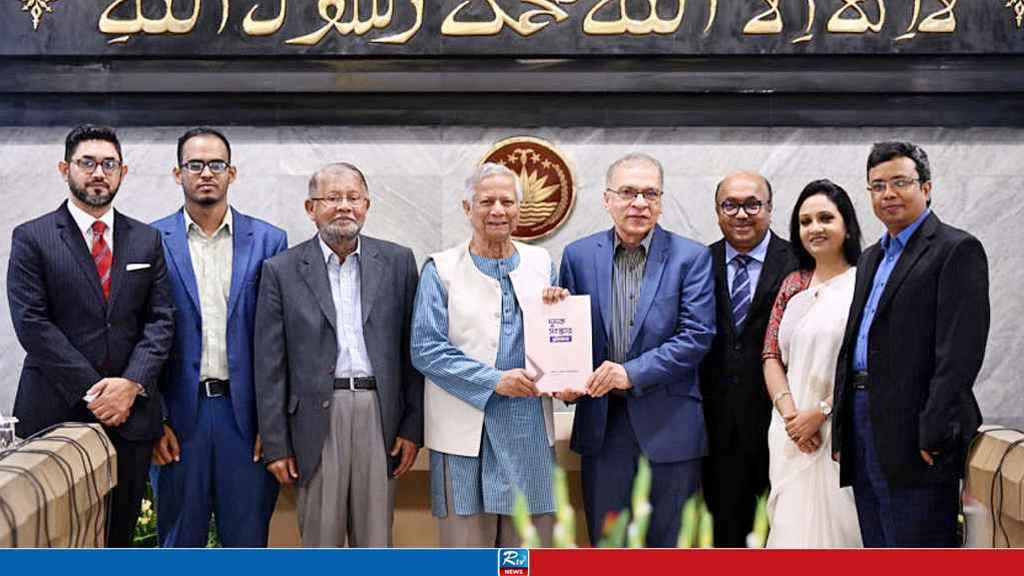National
ACC Reform: 47 Recommendations Suggested
Sunday, 09 February 2025 , 10:28 AM

A total of 47 recommendations have been proposed for the reform of the Anti-Corruption Commission (ACC), including the formation of a special task force led by the ACC, comprising senior officials from various agencies, to investigate high-level corruption cases such as money laundering. The recommendations also suggest granting the ACC ‘independent’ and ‘constitutional’ recognition.
This information was revealed in the full report of the ACC Reform Commission, published on the Cabinet Division’s website on Saturday (February 8). The commission had submitted its preliminary report to the Chief Adviser on January 15.
The report includes 37 recommendations to establish the ACC as an ‘effective’ state institution, along with 10 state-level initiatives aimed at preventing abuse of power and amending relevant laws.
According to the first recommendation of the reform commission, Article 20(2) of the Constitution of the People’s Republic of Bangladesh should be amended to ensure that no individual can misuse constitutional and legal powers for personal gain or enjoy unearned income. The amendment should also emphasize that all forms of intellectual and physical labor contribute to creative endeavors and the full expression of human potential.
The second recommendation calls for replacing the existing National Integrity Strategy with a comprehensive National Anti-Corruption Strategy. It also proposes the creation of an Ombudsman under Article 77 of the Constitution, who would be empowered to ensure the effective implementation of this strategy.
Other key recommendations include:
Ending the legalization of undisclosed income permanently (3rd recommendation).
Enacting laws to prevent conflicts of interest and misuse of state and legal authority (4th recommendation).
Mandatory public registration and disclosure of ultimate beneficiaries of companies, trusts, and foundations (5th recommendation).
Ensuring transparency and accountability in political and electoral financing through necessary reforms in election laws (6th recommendation).
Automating service delivery systems in key government institutions such as police stations, registry offices, tax offices, passport offices, education, health, and local administration (7th recommendation).
Criminalizing bribery in the private sector in accordance with Article 21 of the United Nations Convention Against Corruption (UNCAC) (8th recommendation).
Implementing the Common Reporting Standards (CRS) to ensure transparency in financial transactions both domestically and internationally (9th recommendation).
Joining the Open Government Partnership (OGP) initiative to enhance governmental transparency (10th recommendation).
The 11th recommendation proposes granting constitutional recognition to the ACC, while the 12th suggests increasing the number of ACC commissioners from three to five, with at least one being a woman.
Further recommendations include amending the ACC Act of 2004 to ensure that commissioners have a minimum of 15 years of experience in relevant fields such as law, administration, finance, or anti-corruption work. Additionally, the tenure of ACC commissioners should be reduced from five years to four (13th & 14th recommendations).
The commission also suggests renaming the ACC’s selection committee to the “Selection and Review Committee” and expanding its scope (15th to 18th recommendations).
For investigations and prosecution, the recommendations include:
Reforming the ACC’s case screening committee and removing the mandatory pre-investigation requirement for all scheduled offenses (19th-22nd recommendations).
Developing a prosecution policy and amending the ACC Act to grant the police authority to investigate cases referred by the ACC (23rd recommendation).
Abolishing Section 32A of the ACC Act (24th recommendation).
Establishing Special Judge Courts in all districts where ACC offices exist, with provisions for expanding them as needed (25th recommendation).
The commission also emphasizes the need for reviewing plea bargaining mechanisms (26th recommendation) and establishing collaborative agreements with agencies such as the NBR, CID, BFIU, and Directorate of Registration to facilitate ACC investigations (27th recommendation).
To investigate high-profile corruption and financial crimes, particularly money laundering, the report recommends forming a specialized task force comprising senior officials from multiple agencies under the leadership of the ACC (28th recommendation).
Additionally, the recommendations call for:
Exempting the ACC from the restrictions imposed by Section 309 of the Income Tax Act, 2023, when seeking information (29th recommendation).
Ensuring that corruption findings by the CAG or IMED are immediately reported to the ACC (30th recommendation).
In terms of institutional and financial management, the commission suggests:
Increasing the number of ACC Directors General from 8 to 12 and establishing 12 specialized divisions under their supervision (31st-47th recommendations).
Gradually expanding ACC offices to all districts with sufficient logistical capacity.
Recruiting ACC secretaries through an open, competitive process.
Introducing a specialized pay scale for ACC employees, with salaries at least twice the national pay scale, along with risk allowances and financial incentives.
Forming a high-powered task force to identify corrupt officials and employees within government agencies and ensuring their dismissal and prosecution.
Dissolving the ACC’s internal anti-corruption committee and replacing it with an independent internal disciplinary division.
Following the fall of the Sheikh Hasina government on August 5, the interim administration established 11 reform commissions in two phases, including commissions for election reforms, police administration, judiciary, ACC, public administration, and constitutional reforms. The ACC Reform Commission was formed in early October.
